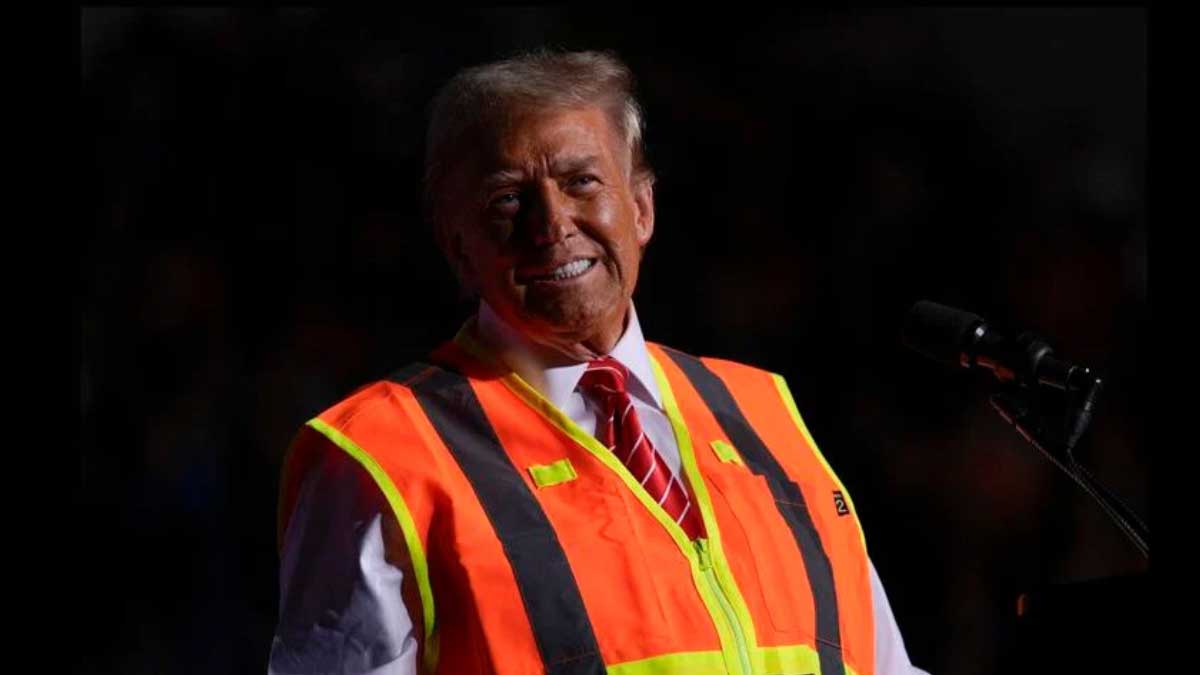- Home
- Billionaires
- Investing Newsletters
- 193CC 1000
- Article Layout 2
- Article Layout 3
- Article Layout 4
- Article Layout 5
- Article Layout 6
- Article Layout 7
- Article Layout 8
- Article Layout 9
- Article Layout 10
- Article Layout 11
- Article Layout 12
- Article Layout 13
- Article Layout 14
- Article Sidebar
- Post Format
- pages
- Archive Layouts
- Post Gallery
- Post Video Background
- Post Review
- Sponsored Post
- Leadership
- Business
- Money
- Small Business
- Innovation
- Shop
Recent Posts
Trump and Harris: Is an Electoral College Tie Possible?

As the countdown to Election Day intensifies, former President Donald Trump and Vice President Kamala Harris find themselves in a tight race, with national polls indicating a dead heat. With less than a week to go, there’s a slim possibility that the election could culminate in an Electoral College tie, which would set the stage for an unprecedented scenario in U.S. presidential elections. In such an unlikely event, it is anticipated that Trump would have a favorable advantage in the subsequent selection process.
If the election concludes with both Trump and Harris securing 269 electoral votes, the decision would shift to the House of Representatives, which would vote to determine the next president, while the Senate would elect the vice president. This process is outlined in the 12th Amendment of the U.S. Constitution, requiring the House to convene on January 6, 2025, to cast their votes. In this situation, the voting method diverges from a standard electoral process. Each state delegation would cast a single vote for one of the top three candidates based on electoral votes, rather than each representative voting individually. This means larger states with more congressional representatives, such as California and Texas, hold significant influence compared to smaller states like Wyoming, which has only one representative.
The expectation is that state delegations would vote largely along party lines. Currently, Republicans are projected to have the upper hand in controlling the majority of these delegations following the election, despite a close contest for control of the House seats overall. Should the Senate also shift to Republican control, as forecasts suggest, the vice presidential vote would require a simple majority of 51 votes. In a scenario where neither candidate can garner votes from at least 26 state delegations before Inauguration Day, the vice president elected by the Senate would assume the role of acting president until the House settles on the presidential choice.
While a 269-269 tie in the Electoral College is theoretically possible, the odds are heavily against it. According to FiveThirtyEight, the likelihood stands at roughly 1 in 300. Several scenarios could lead to this outcome. For example, if Harris wins all the states that Biden secured in 2020 except for Michigan and Pennsylvania, or if she manages to flip North Carolina while Trump wins Michigan, Pennsylvania, Wisconsin, and Nevada, a tie could result. Additionally, a tie could occur if Harris captures the critical “blue wall” states of Michigan, Pennsylvania, and Wisconsin, while Trump takes the other swing states plus Nebraska’s 2nd congressional district, which traditionally leans Democratic.
The election’s outcome could also take a “contingent” turn if a third-party candidate wins electoral votes, resulting in neither Trump nor Harris reaching the 270-vote threshold necessary for victory. While current polls suggest it is improbable for third-party candidates to garner electoral votes, approximately half of the states do not legally mandate their electors to vote according to the popular vote. This creates a situation where electors could potentially vote for a third-party candidate, complicating the election outcome. Instances of “faithless electors,” though rare, have occurred in the past—most notably, in the 2016 election when five electors pledged to Hillary Clinton and two pledged to Trump cast their votes for other candidates.
A significant 94 electoral votes are at stake across seven swing states, plus Nebraska’s 2nd congressional district. If Harris wins all the states that Biden won in 2020, which is anticipated, she would start with 225 electoral votes, leaving Trump with 219. This sets the stage for a highly competitive electoral map, with every vote crucial in these battleground states.
An Electoral College tie has not happened since the contentious election of 1800, when Thomas Jefferson faced off against incumbent President John Adams. The election went to Congress after 36 ballots before Jefferson was elected. In 1824, multiple candidates received electoral votes, with Andrew Jackson obtaining the most but not a majority, leading to the House electing John Quincy Adams instead.
The system of electors is designed so that each state is assigned a number of electors equal to its representation in Congress, with a total of 538 electors nationwide, including three for the District of Columbia. Political parties in each state nominate their electors during party conventions. Federal employees and elected officials cannot serve as electors. While electors are pledged to vote for their state’s winning candidate, they are not strictly bound to do so. Some states impose penalties for faithless electors who do not follow the popular vote. Notably, Maine and Nebraska employ a different system, distributing their electoral votes in a partially proportional manner. In closely contested elections, Nebraska’s 2nd congressional district plays a crucial role. If Harris wins all the states Biden secured in 2020 along with this district, she would achieve exactly 270 electoral votes, making it a pivotal point in her path to victory. As Election Day approaches, all eyes will be on these electoral dynamics, underscoring the importance of every vote and the potential implications of a tie in this high-stakes political landscape.
Recent Posts
Categories
- 193cc Digital Assets2
- 5G1
- Aerospace & Defense46
- AI37
- Arts3
- Banking & Insurance11
- Big Data3
- Billionaires449
- Boats & Planes1
- Business328
- Careers13
- Cars & Bikes76
- CEO Network1
- CFO Network17
- CHRO Network1
- CIO Network1
- Cloud10
- CMO Network18
- Commercial Real Estate7
- Consultant1
- Consumer Tech180
- CxO1
- Cybersecurity68
- Dining1
- Diversity, Equity & Inclusion4
- Education7
- Energy8
- Enterprise Tech29
- Events11
- Fintech1
- Food & Drink2
- Franchises1
- Freelance1
- Future Of Work2
- Games141
- GIG1
- Healthcare78
- Hollywood & Entertainment186
- Houses1
- Innovation42
- Investing2
- Investing Newsletters4
- Leadership65
- Lifestyle11
- Manufacturing1
- Markets20
- Media193
- Mobile phone1
- Money13
- Personal Finance2
- Policy567
- Real Estate1
- Research6
- Retail1
- Retirement1
- Small Business1
- SportsMoney33
- Style & Beauty1
- Success Income1
- Taxes2
- Travel10
- Uncategorized8
- Vices1
- Watches & Jewelry2
- world's billionaires418
Related Articles
Trump Moves $4B Stake in Truth Social Parent, Stock Drops 6%
Donald Trump recently transferred his 57% stake in Trump Media & Technology...
By 193cc Agency CouncilDecember 20, 2024House Rejects Trump-Backed Funding Bill, Shutdown Looms
The U.S. House of Representatives rejected a new government funding bill on...
By 193cc Agency CouncilDecember 20, 2024Trump Named Time’s Person of the Year for Second Time
On Thursday, Time magazine honored Donald Trump as its “Person of the...
By 193cc Agency CouncilDecember 12, 2024Meta Donates $1 Million to Trump’s Inaugural Fund
Meta, the parent company of Facebook and Instagram, has confirmed a $1...
By 193cc Agency CouncilDecember 12, 2024















Leave a comment